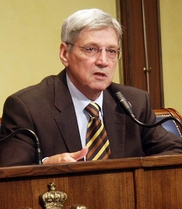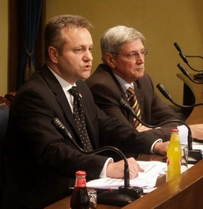Q:
A:
National strategy for combating corruption adopted
Belgrade,
26 May 2005
Serbian Minister of Justice Zoran Stojkovic stated that with the adoption of the Decision on determining the National Strategy for Combating Corruption at today’s Serbian government session, one of the obligations on the country’s path towards the EU has been fulfilled.
Stojkovic told a press conference that this is a document that presents the situation in the country in the area of corruption, the goals that need to be attained and basic principles and recommendations for all areas that need to be fulfilled in order to reduce corruption to a manageable degree.
According to him, the government has carried out a part of its obligations by adopting the National Strategy for Combating Crime, and after it is adopted by the Serbian parliament, a so-called action plan will have to be made.
The Minister said that this plan is already being made and that according to the Twinning Programme, Germany was appointed as chief controller, through Slovenia, and expressed hope that the action programme would be adopted by the parliament soon.
Serbian Minister of Finance Mladjan Dinkic said that the government adopted three laws in the area of finance and a bill on customs tariffs, a bill on changes and amendments to the customs law and a bill on changes and amendments to the Law on administrative fees.
He pointed out that the custom tariffs law changes customs rates by harmonising them with the new EU standard, the so-called HSC 1000/2002, creating conditions for the beginning of negotiations on stabilisation and association with the EU.
The number of tariff positions has been increased from 8543 to 10268, which means that products are grouped into a larger number of tariff groups, thus more adequately organising their import, Dinkic said. He added that this law increases the customs rate for 175 products, while reducing it for 162.
Products whose rates were reduced after the adoption of the Action Plan for harmonising the economic system with Montenegro will be increased, while the customs rates of certain raw materials, which were unnecessarily increased, will be reduced, the Minister explained.
According to him, the government has carried out a part of its obligations by adopting the National Strategy for Combating Crime, and after it is adopted by the Serbian parliament, a so-called action plan will have to be made.
The Minister said that this plan is already being made and that according to the Twinning Programme, Germany was appointed as chief controller, through Slovenia, and expressed hope that the action programme would be adopted by the parliament soon.
Serbian Minister of Finance Mladjan Dinkic said that the government adopted three laws in the area of finance and a bill on customs tariffs, a bill on changes and amendments to the customs law and a bill on changes and amendments to the Law on administrative fees.
He pointed out that the custom tariffs law changes customs rates by harmonising them with the new EU standard, the so-called HSC 1000/2002, creating conditions for the beginning of negotiations on stabilisation and association with the EU.
The number of tariff positions has been increased from 8543 to 10268, which means that products are grouped into a larger number of tariff groups, thus more adequately organising their import, Dinkic said. He added that this law increases the customs rate for 175 products, while reducing it for 162.
Products whose rates were reduced after the adoption of the Action Plan for harmonising the economic system with Montenegro will be increased, while the customs rates of certain raw materials, which were unnecessarily increased, will be reduced, the Minister explained.
He said that the custom rates will be increased for 175 products whose import last year was 700 million dinars, and added that these are mainly consumer goods.
The custom rate for flour will be increased from 5 percent to 20 percent in order to protect the local flourmills and bakeries, Dinkic said and added that the rates will also be increased for certain kinds of fruit and vegetables produced locally, while the rate for citrus fruits will be reduced in agreement with the EU.
He said that the rates will be increased for certain industrial products, such as automobile tyres, from 10 percent to 20 percent, as well as for lumber industry products.
Speaking of the effects of custom rates changes, the Minister emphasised that the average rate is now 8.8 percent, while these changes will reduce it to 8.71 percent, which is a minimal reduction of 0.09 percent.
The weighted custom rate will remain 6.3 percent, Dinkic explained and mentioned that after the adoption of the new custom tariff, a starting position for negotiations with the EU and the World Trade Organisation will be created, as one of the key elements in those negotiations will be the giving of concessions, that is further reduction of customs tariffs for certain groups of products over a certain period of time.
Explaining the changes and amendments to the customs law, the Minister said that they will allow citizens who live abroad to import household goods, with exception of motor vehicles, without paying customs, while certain disabled persons will be allowed to import motor vehicles without customs. He added that this law defines the procedure of becoming a customs agent, and the opening of “duty-free” shops at airports.
According to him, this law allows the government to increase or decrease customs rates, by 50 percent at most.
According to Dinkic, this will make the procedure for changing tariffs more flexible as they will not have to undergo the full parliamentary procedure when the country’s talks with the EU and the WTO call for changes.
He said that it is realistic to expect that Serbia’s tariffs will only continue to drop, given that the country enjoys the privilege of duty-free exports to EU countries.
According to him, in the course of talks with the EU and the WTO, Serbia must gradually reduce tariffs until they eventually fall to zero percent.
With the Decree on the use of funds for food safety certification, proposed by the Ministry of Agriculture, Forestry, and Water Management, the government envisages that all producers who are introducing standards for the improvement of quality will be entitled to an 800,000 dinar grant from a total budget of 200 million dinars earmarked for this purpose.
Dinkic warned food manufacturers that as of June 1, 2006, these standards will be obligatory for all exporters of meat, fruit, and vegetables to the EU.
He also stressed that the prices of fuels cannot go up on Saturday, May 28, given that the Decree on changes to derivative prices comes into force on that day.
Dinkic explained that the Ministry of Energy and Mining must obtain consent of the Ministry of Finance and the Ministry of Trade in order to change the prices of oil derivatives.
The Ministry of Finance will wait for the parliament to finish the debate, which starts on Monday, May 30, said Dinkic and added that the lawmakers will also discuss lowering the excise taxes on oil derivatives.
The custom rate for flour will be increased from 5 percent to 20 percent in order to protect the local flourmills and bakeries, Dinkic said and added that the rates will also be increased for certain kinds of fruit and vegetables produced locally, while the rate for citrus fruits will be reduced in agreement with the EU.
He said that the rates will be increased for certain industrial products, such as automobile tyres, from 10 percent to 20 percent, as well as for lumber industry products.
Speaking of the effects of custom rates changes, the Minister emphasised that the average rate is now 8.8 percent, while these changes will reduce it to 8.71 percent, which is a minimal reduction of 0.09 percent.
The weighted custom rate will remain 6.3 percent, Dinkic explained and mentioned that after the adoption of the new custom tariff, a starting position for negotiations with the EU and the World Trade Organisation will be created, as one of the key elements in those negotiations will be the giving of concessions, that is further reduction of customs tariffs for certain groups of products over a certain period of time.
Explaining the changes and amendments to the customs law, the Minister said that they will allow citizens who live abroad to import household goods, with exception of motor vehicles, without paying customs, while certain disabled persons will be allowed to import motor vehicles without customs. He added that this law defines the procedure of becoming a customs agent, and the opening of “duty-free” shops at airports.
According to him, this law allows the government to increase or decrease customs rates, by 50 percent at most.
According to Dinkic, this will make the procedure for changing tariffs more flexible as they will not have to undergo the full parliamentary procedure when the country’s talks with the EU and the WTO call for changes.
He said that it is realistic to expect that Serbia’s tariffs will only continue to drop, given that the country enjoys the privilege of duty-free exports to EU countries.
According to him, in the course of talks with the EU and the WTO, Serbia must gradually reduce tariffs until they eventually fall to zero percent.
With the Decree on the use of funds for food safety certification, proposed by the Ministry of Agriculture, Forestry, and Water Management, the government envisages that all producers who are introducing standards for the improvement of quality will be entitled to an 800,000 dinar grant from a total budget of 200 million dinars earmarked for this purpose.
Dinkic warned food manufacturers that as of June 1, 2006, these standards will be obligatory for all exporters of meat, fruit, and vegetables to the EU.
He also stressed that the prices of fuels cannot go up on Saturday, May 28, given that the Decree on changes to derivative prices comes into force on that day.
Dinkic explained that the Ministry of Energy and Mining must obtain consent of the Ministry of Finance and the Ministry of Trade in order to change the prices of oil derivatives.
The Ministry of Finance will wait for the parliament to finish the debate, which starts on Monday, May 30, said Dinkic and added that the lawmakers will also discuss lowering the excise taxes on oil derivatives.












